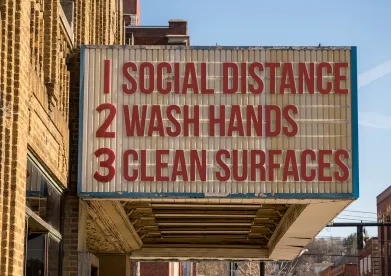On May 5, 2020, the Equal Employment Opportunity Commission (EEOC) issued updates to its COVID-19-related frequently asked questions guidance to address the return to work and accommodation of employees who may have underlying conditions that put them at greater risk of severe illness from COVID-19.
-
Accommodation Requested
-
If an employee has one of the medical conditions identified by the Centers for Disease Control and Prevention (CDC) that may put the employee at higher risk of severe illness from COVID-19, the EEOC advises that the employee, or a third party such as the employee’s doctor, notify the employer that the employee needs an accommodation for a reason related to an underlying medical condition. The request may be formal or informal and does not need to expressly refer to a “reasonable accommodation.” A request, in conversation or in writing, stating that a change is required to meet a medical need is sufficient to trigger the interactive process. In responding to the request, employers are free to ask questions and request medical documentation to determine whether the employee has a disability and if there is a reasonable accommodation that can be provided without undue hardship.
-
Accommodation Not Requested
-
If an employer knows that an employee has one of the medical conditions that the CDC says may put the employee at higher risk for severe illness from COVID-19, but the employee does not request an accommodation, the EEOC advises that the Americans with Disabilities Act of 1990 (ADA) does not mandate any action on the part of the employer. The EEOC warns employers that they are not allowed to exclude employees from the workplace, or take any other adverse action, solely because the employee has a disability that potentially places the employee at higher risk of severe illness from COVID-19. Employers may exclude those employees from the workplace only when the employee’s disability poses a “direct threat” to the employee’s health that cannot be eliminated or reduced by reasonable accommodation. To determine whether a direct threat exists, employers are to consider the duration of the risk, the nature and severity of the potential harm, the likelihood that the potential harm will occur, the imminence of the potential harm and the potential for exposure to COVID-19 at the workplace. A determination of a direct threat does not end the inquiry. Employers still must determine whether there is a reasonable accommodation, absent undue hardship, that can be provided to reduce the risk to the employee. If not, then the employer may exclude the employee from the workplace.
Effective Accommodations
The EEOC suggests the following accommodations to eliminate or reduce the risks to employees with underlying medical conditions:
-
Providing additional or enhanced personal protective equipment, including gowns, masks, gloves or other protective equipment
-
Taking additional or enhanced protective measures, such as erecting physical barriers or increasing space between employees
-
Eliminating “marginal” job functions (i.e., less critical or incidental job duties as distinguished from the “essential” functions of a position)
-
Temporarily modifying work schedules to reduce contact with coworkers, or relocating the employee’s personal workspace to increase social distancing.
-
Identifying an effective accommodation depends on many factors, including the employee’s job duties and the design of the workspace. Consequently, the EEOC encourages employers to discuss with employees the listed examples as well as other possible accommodations.
State and local legislative developments could impact the guidance provided by the EEOC, so employers should consult legal counsel regarding specific circumstances that may arise in the workplace.




 />i
/>i

